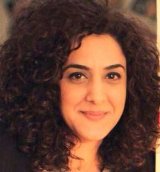
Raghad Jaraisy
I was born to a family that loves language: my father is a politician, an engineer, and a bookworm, and my mother – a children’s writer and researcher, with a doctorate in folklore. At the tender age of 18 months, I had already learned how to read a few words – Mom, Dad, and drum (important words for a kid as vocal and loud as me).
I read books from a young age. I still remember the long family car rides we took to Jordan to fill up on the many quality Arabic books that weren’t available in Israel. I wrote my first book, with my mother’s great help, at the age of five; and my first poem in first, maybe second, grade.
When I was deciding what to study at university, everyone told me to study law; they said that my language comprehension and self-expression skills made me the perfect fit for being a lawyer. These “recommendations” had only one problem: The language that I was so good at was not the language that I would be studying in, nor was it the language that would be my main tool as a lawyer in Israel. This was a small problem for a young girl, that became a big problem for a grown woman.
The start of my studies at Hebrew University was exciting yet complicated. For the first time in my life, I struggled with having conversations and was embarrassed to ask questions in class. My name, Raghad (which means the serenity of life), went from an easy and short Arabic name to a roadblock in participating in class and in conversations and mingling with my peers. The professors struggled to pronounce my name correctly (not to mention remembering it – or me), and I was constantly dealing with surprised looks around me. To this day, I have got to know at least six different variations of my name: Ra’ad, Raad, Ragad, Rajad, Rahad, and Rarad.
I, who was always so proud of my innate language skills, was suddenly confusing simple words and mistakenly using male/female grammar. All of the sudden, words weren’t available to me in the middle of sentences. I read slowly and carefully, and my writing was unsophisticated and very basic.
From that moment, I had developed two personas. The first, a loud, proud Arabic speaking Palestinian woman, who loves writing, literature and culture. And the second, an Arab woman – citizen of Israel, quick to smile and slow to speak, who sometimes runs away from casual conversations with peers about art, literature, and culture.
Almost every Arab man and woman in Israel lives with this very dissonance. A dissonance that is the result of “sterile”, clean from Arabic, public spaces (even in academia, the center of enlightenment and modernity), and of a racist, nationalist, and despotic government that fights to no end against the “enemy from within”- the Palestinian Arab minority in Israel. The “Nation-State Law” and other such government and non-governmental initiatives that hurt the status of the Arabic language, and as a result, Arabic-Palestinian culture and identity in Israel, only serve to strengthen and increase this dissonance.
However, these ongoing attempts to push both the Arabic language, culture and identity into the margins and Arab people into second-class citizenship, only encourages us to make, create, and build culture and language; art and literature. Just as our tasks to create and build become increasingly hard and challenging, so too, our lives in this country were, are, and will always be: challenging and difficult.
Every attempt to push the Arab citizens of Israel to the margins is another stain on democracy, pluralism, culture and the basic human rights of citizens, and really, every human being. But the most important point is: Every attempt to strengthen Jewish supremacy, to force Arabs in Israel to “integrate” in the public space through compulsory use of the majority language and culture is set up to fail.
Attorney Raghad Jaraisy, Head of ACRI’s Arab Minority Rights Unit
(This article appeared on 07-16-2018 in Yediot Aharonot Hebrew newspaper at the following link)







